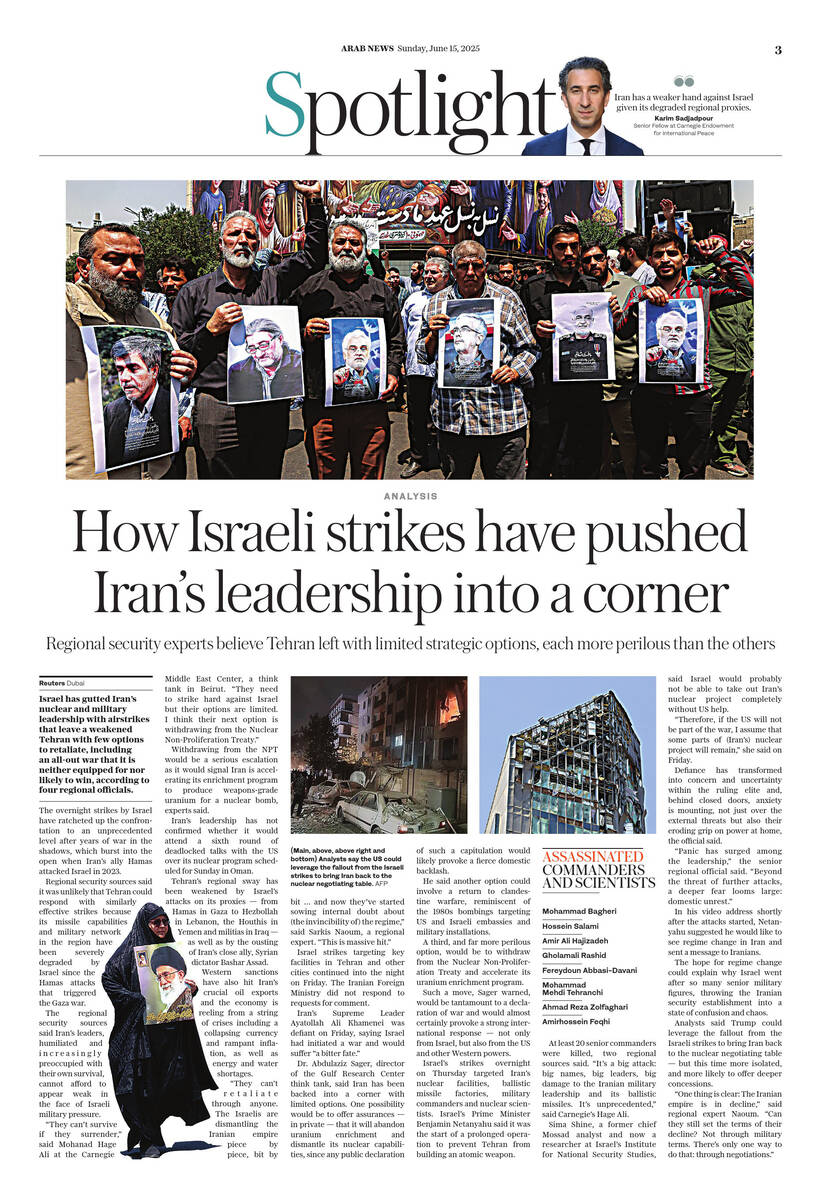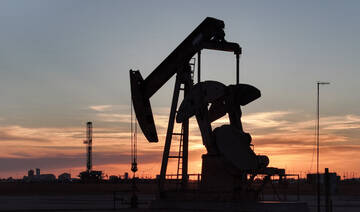DUBAI: Israel has gutted Iran’s nuclear and military leadership with airstrikes that leave a weakened Tehran with few options to retaliate, including an all-out war that it is neither equipped for nor likely to win, according to four regional officials.
The overnight strikes by Israel – repeated for second night on Friday – have ratcheted up the confrontation between the arch foes to an unprecedented level after years of war in the shadows, which burst into the open when Iran’s ally Hamas attacked Israel in 2023.
READ: Iran warns US, UK and France against helping stop strikes on Israel
Regional security sources said it was unlikely that Tehran could respond with similarly effective strikes because its missile capabilities and military network in the region have been severely degraded by Israel since the Hamas attacks that triggered the Gaza war.
State news agency IRNA said that Iran launched hundreds of ballistic missiles at Israel on Friday in retaliation. But the Israeli military said the missiles numbered fewer than 100 and most were intercepted or fell short. No casualties were immediately reported.

Rescue personnel work at an impact site following missile attack from Iran in Ramat Gan, Israel on June 14, 2025. (Reuters)
The regional security sources said Iran’s leaders, humiliated and increasingly preoccupied with their own survival, cannot afford to appear weak in the face of Israeli military pressure, raising the prospect of further escalation – including covert attacks on Israel or even the perilous option of seeking to build a nuclear bomb rapidly.
“They can’t survive if they surrender,” said Mohanad Hage Ali at the Carnegie Middle East Center, a think tank in Beirut. “They need to strike hard against Israel but their options are limited. I think their next option is withdrawing from the Nuclear Non-Proliferation Treaty.”
Withdrawing from the NPT would be a serious escalation as it would signal Iran is accelerating its enrichment program to produce weapons-grade uranium for a nuclear bomb, experts said.
READ: UN chief urges ‘maximum restraint’ after Israel strikes Iran
Iran’s leadership has not confirmed whether it would attend a sixth round of deadlocked talks with the US over its nuclear program scheduled for Sunday in Oman.
Tehran’s regional sway has been weakened by Israel’s attacks on its proxies – from Hamas in Gaza to Hezbollah in Lebanon, the Houthis in Yemen and militias in Iraq – as well as by the ousting of Iran’s close ally, Syrian dictator Bashar Assad.
Western sanctions have also hit Iran’s crucial oil exports and the economy is reeling from a string of crises including a collapsing currency and rampant inflation, as well as energy and water shortages.

People gather for a protest against Israel’s wave of strikes on Iran in central Tehran on June 13, 2025. (AFP)
“They can’t retaliate through anyone. The Israelis are dismantling the Iranian empire piece by piece, bit by bit … and now they’ve started sowing internal doubt about (the invincibility of) the regime,” said Sarkis Naoum, a regional expert. “This is massive hit.”
Israel strikes targeting key facilities in Tehran and other cities continued into the night on Friday. The Iranian foreign ministry did not respond to requests for comment.
Iran’s Supreme Leader Ayatollah Ali Khamenei was defiant on Friday, saying Israel had initiated a war and would suffer “a bitter fate.”
Dr. Abdulaziz Sager, director of the Gulf Research Center think tank, said Iran has been backed into a corner with limited options. One possibility would be to offer assurances – in private – that it will abandon uranium enrichment and dismantle its nuclear capabilities, since any public declaration of such a capitulation would likely provoke a fierce domestic backlash.

Sites of strikes and explosions following the attack of June 13.
He said another option could involve a return to clandestine warfare, reminiscent of the 1980s bombings targeting US and Israeli embassies and military installations.
A third, and far more perilous option, would be to withdraw from the Nuclear Non-Proliferation Treaty and accelerate its uranium enrichment program.
Such a move, Sager warned, would be tantamount to a declaration of war and would almost certainly provoke a strong international response – not only from Israel, but also from the US and other Western powers.
Trump has threatened military action to ensure Iran does not obtain an atomic weapon. He reiterated his position on Thursday, saying: “Iran must completely give up hopes of obtaining a nuclear weapon.”

First responders gather outside a building that was hit by an Israeli strike in Tehran on June 13, 2025. (Tasnim News/AFP)
Iran is currently enriching uranium up to 60 percent purity, close to the roughly 90 percent it would need for nuclear weapons. It has enough material at that level, if processed further, for nine nuclear bombs, according to a UN nuclear watchdog yardstick.
Israel’s strikes overnight on Thursday targeted Iran’s nuclear facilities, ballistic missile factories, military commanders and nuclear scientists. Israel’s Prime Minister Benjamin Netanyahu said it was the start of a prolonged operation to prevent Tehran from building an atomic weapon.
At least 20 senior commanders were killed, two regional sources said. The armed forces chief of staff, Major General Mohammad Bagheri, Revolutionary Guards Chief Hossein Salami, and the head of the Revolutionary Guards Aerospace Force, Amir Ali Hajizadeh, were among them.

People chant slogans during a protest against Israel’s wave of strikes on Iran in Enghelab (Revolution) Square in central Tehran on June 13, 2025. ( AFP)
“It’s a big attack: big names, big leaders, big damage to the Iranian military leadership and its ballistic missiles. It’s unprecedented,” said Carnegie's Hage Ali.
Sima Shine, a former chief Mossad analyst and now a researcher at Israel’s Institute for National Security Studies (INSS), said Israel would probably not be able to take out Iran’s nuclear project completely without US help.
“Therefore, if the US will not be part of the war, I assume that some parts of (Iran’s) nuclear project will remain,” she said on Friday.

Above, a handout satellite image released by Planet Labs on June 13, 2025, shows the Natanz nuclear facilities (Shahid Ahmadi Roshan Nuclear Facilities) near Ahmadabad, Iran on May 20, 2025. (Planet Labs/AFP)
Friday’s strikes have not only inflicted strategic damage but have also shaken Iran’s leadership to the core, according to a senior regional official close to the Iranian establishment.
Defiance has transformed into concern and uncertainty within the ruling elite and, behind closed doors, anxiety is mounting, not just over the external threats but also their eroding grip on power at home, the official said.
“Panic has surged among the leadership,” the senior regional official said. “Beyond the threat of further attacks, a deeper fear looms large: domestic unrest.”
A moderate former Iranian official said the killing in 2020 of General Qassem Soleimani, commander of the overseas arm of Iran’s Revolutionary Guards, on the orders of President Donald Trump, started the rot.
Since then, the Islamic Republic has struggled to reassert its influence across the region and has never fully recovered. “This attack might be the beginning of the end,” he said.
If protests erupt, and the leadership responds with repression, it will only backfire, the former official said, noting that public anger has been simmering for years, fueled by sanctions, inflation and an unrelenting crackdown on dissent.
In his video address shortly after the attacks started, Netanyahu suggested he would like to see regime change in Iran and sent a message to Iranians.
“Our fight is not with you. Our fight is with the brutal dictatorship that has oppressed you for 46 years. I believe the day of your liberation is near,” he said.
The hope for regime change could explain why Israel went after so many senior military figures, throwing the Iranian security establishment into a state of confusion and chaos.
“These people were very vital, very knowledgeable, many years in their jobs, and they were a very important component of the stability of the regime, specifically the security stability of the regime,” said Shine.
Iranian state media reported that at least two nuclear scientists, Fereydoun Abbasi and Mohammad Mehdi Tehranchi, were killed in Israeli strikes in Tehran.
Iran’s most powerful proxy in the region, Lebanese armed group Hezbollah, is also in a weak position to respond.
In the days leading up to the strikes on Iran, security sources close to Hezbollah told Reuters the group would not join any retaliatory action by Iran out of fear such a response could unleash a new Israeli blitz on Lebanon.
Israel’s war last year against Hezbollah left the group badly weakened, with its leadership decimated, thousands of its fighters killed, and swathes of its strongholds in southern Lebanon and Beirut’s suburbs destroyed.
Analysts said Trump could leverage the fallout from the Israeli strikes to bring Iran back to the nuclear negotiating table – but this time more isolated, and more likely to offer deeper concessions.
“One thing is clear: the Iranian empire is in decline,” said regional expert Naoum. “Can they still set the terms of their decline? Not through military terms. There’s only one way to do that: through negotiations.”






























